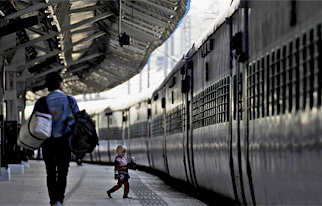 New Delhi, Oct 5: Rail travel will become costly from Monday with the cash-strapped railways deciding to increase passenger fares in all mail and express trains by 2% and freight tariff by 1.7% across the board.
New Delhi, Oct 5: Rail travel will become costly from Monday with the cash-strapped railways deciding to increase passenger fares in all mail and express trains by 2% and freight tariff by 1.7% across the board.
The passenger fare hike will be applicable from October 7 and revised freight charges will come into effect from October 10. This is the second increase in passenger fares this year after a 20% hike in January.
After the increase, the AC first class fare of Delhi-Mumbai Rajdhani Express will go up by around Rs 80, Delhi-Kolkata fare in the same class will see a similar hike while Delhi-Chennai fare will go up by around Rs 100.
The "aam aadmi" has been spared as the increase will not be applicable on suburban trains and monthly pass holders of general classes.
The decision is expected to fuel inflation further as only last week, railways had imposed busy season charges of 15% on all freight commodities, leading to an increase in the prices of essential commodities.
This fare hike paves the way for railways to routinely revise passenger tariff taking into account the increase in input cost, mainly fuel cost.
Passenger fare was not revised as it was considered "unpopular" by leaders, leading to loss of Rs 25,000 crore a year on account of passenger tariff. "This is a big move in the direction of de-politicization of passenger tariff," an official said.
The revision has come in the form of fuel adjustment component (FAC) which was announced in the last rail budget to make adjustments for spiraling fuel prices. In the budget, it was announced that FAC would be revised every six months.
The state-run transporter has decided to pass the financial burden arising out of increased input cost — additional burden of 7.3% increase in diesel price and about 16% hike in electricity charges — on to customers.
According to estimates, railways will bear a burden of Rs 1,200 crore due to increased energy and input cost in the next six month. The revised passenger fares will get railways an extra revenue of Rs 420 crore in the remaining months of this fiscal and the transporter is expected to earn Rs 790 crore from increased freight tariff. FAC was implemented for the first time in April this year.





Comments
Add new comment